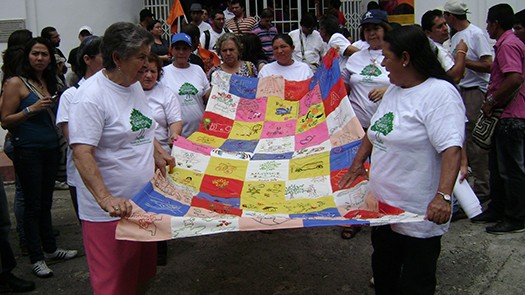NEW YORK – The Swedish International Development Cooperation Agency (Sida) has awarded the International Center for Transitional Justice (ICTJ) a grant of 40 million Swedish kronor to implement its Strategic Plan 2018-2022. During this period, ICTJ will respond to the growing demand for its services from countries in transition to democracy, as well as contexts where conflict or political repression are ongoing. In addition, ICTJ will reframe and emphasize how transitional justice contributes to advancing progress towards peaceful, just, and inclusive societies and develop innovative solutions that will be shared with partners worldwide.
The new agreement reaffirms the longstanding partnership between ICTJ and Sweden. Sweden, through Sida and the Ministry of Foreign Affairs and its Embassies, has been a key supporter of ICTJ since 2003, providing major unrestricted funding, flexible funds for work in emerging contexts, and program support in crucial contexts such as Colombia.
“We are very grateful and proud of our partnership with Sweden, a recognized global leader in international cooperation focused on peacebuilding, prevention of violence, and protection of human security,” said Fernando Travesí, Executive Director of ICTJ. “Through Sida’s generous support, we can consolidate our comparative experience and strategic learning on transitional justice, and continue to work toward our common objective of helping societies break the cycle of violence and advance sustainable peace.”
The 2018-2022 grant from Sida includes increased general operating support to continue ICTJ's work building capacity of victim’s groups and civil society organizations and providing tailored technical assistance and strategic advice to government representatives and the international community alike. The grant also includes flexible funding designated for responding to new opportunities arising during critical stages of peacebuilding and state-building processes and prevention of armed conflict.
“We have come to recognise ICTJ as a key actor in the field of Transitional Justice, in redressing human rights abuses and assisting in the processes of building societies based on justice and the rule of law. ICTJ has a central role to play on the global arena as an expert organisation, a policy development actor, a partner to civil society, to public institutions, and to governments at state level. It is for these reasons ICTJ has become an important partner to Sweden in promoting SDG 16 and the sustaining peace agenda, and that is why we have renewed our multi-year core support to the organisation,” says Petra Smitmanis-Dry, Head of the Peace and Human Security Unit at Sida. “We find the efforts of ICTJ especially important, in times when transitional justice and the fight against impunity, corruption, and the promotion of accountability are under severe pressure in conflict-affected states.”
Individuals and organizations interested in supporting ICTJ are invited to contact Julia Fishkin at +1 917-637-3986 or via email at jfishkin@ictj.org for more information.
About Sida
Sida is a government agency working on behalf of the Swedish parliament and government, with the mission to reduce poverty in the world. Through its work and in cooperation with others, Sida contributes to implementing Sweden’s Policy for Global Development (PGU).
About ICTJ
ICTJ is an international nongovernmental organization that works across society and borders to challenge the causes and address the consequences of massive human rights violations. ICTJ affirms victims’ dignity, fights impunity, and promotes responsive institutions to lay the foundations for peace, justice and inclusion. ICTJ has worked in over 50 countries, leveraging its experience to articulate lessons learned, identify emerging patterns, develop innovative approaches and inform global policy debates.
PHOTO: Memorialization projects are a way to promote healing and break the cycles of violence in many of the contexts in which ICTJ works. In this photo, relatives commemorate victims after eight years of violence and killings in Trujillo, Valle del Cauca, Colombia, in 2012. (Andersson Lizarazo and and Lady Rojas/ICTJ).
